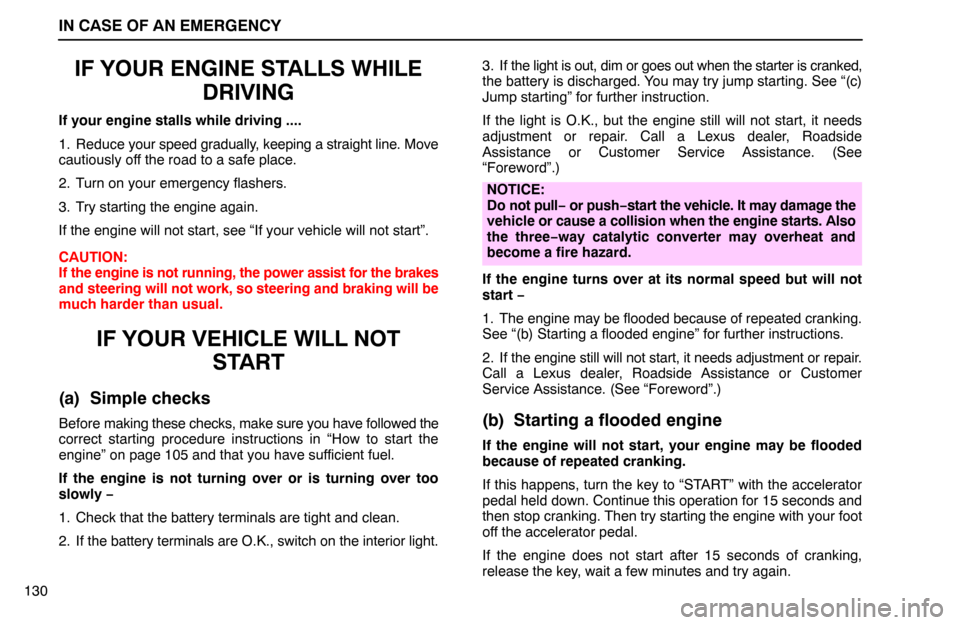steering Lexus ES300 1995 In Case Of An Emergency
[x] Cancel search | Manufacturer: LEXUS, Model Year: 1995, Model line: ES300, Model: Lexus ES300 1995Pages: 15, PDF Size: 5.01 MB
Page 2 of 15

IN CASE OF AN EMERGENCY
130
IF YOUR ENGINE STALLS WHILE
DRIVING
If your engine stalls while driving ....
1. Reduce your speed gradually, keeping a straight line. Move
cautiously off the road to a safe place.
2. Turn on your emergency flashers.
3. Try starting the engine again.
If the engine will not start, see “If your vehicle will not start”.
CAUTION:
If the engine is not running, the power assist for the brakes
and steering will not work, so steering and braking will be
much harder than usual.
IF YOUR VEHICLE WILL NOT
START
(a) Simple checks
Before making these checks, make sure you have followed the
correct starting procedure instructions in “How to start the
engine” on page 105 and that you have sufficient fuel.
If the engine is not turning over or is turning over too
slowly −
1. Check that the battery terminals are tight and clean.
2. If the battery terminals are O.K., switch on the interior light.3. If the light is out, dim or goes out when the starter is cranked,
the battery is discharged. You may try jump starting. See “(c)
Jump starting” for further instruction.
If the light is O.K., but the engine still will not start, it needs
adjustment or repair. Call a Lexus dealer, Roadside
Assistance or Customer Service Assistance. (See
“Foreword”.)
NOTICE:
Do not pull− or push−start the vehicle. It may damage the
vehicle or cause a collision when the engine starts. Also
the three−way catalytic converter may overheat and
become a fire hazard.
If the engine turns over at its normal speed but will not
start −
1. The engine may be flooded because of repeated cranking.
See “(b) Starting a flooded engine” for further instructions.
2. If the engine still will not start, it needs adjustment or repair.
Call a Lexus dealer, Roadside Assistance or Customer
Service Assistance. (See “Foreword”.)
(b) Starting a flooded engine
If the engine will not start, your engine may be flooded
because of repeated cranking.
If this happens, turn the key to “START” with the accelerator
pedal held down. Continue this operation for 15 seconds and
then stop cranking. Then try starting the engine with your foot
off the accelerator pedal.
If the engine does not start after 15 seconds of cranking,
release the key, wait a few minutes and try again.
Page 14 of 15

IN CASE OF AN EMERGENCY
Emergency towing eyeletsEmergency towing eyelet
Cover of
shift lock
override button
142
Emergency towing
If towing service is not available in an emergency, your
vehicle may be temporarily towed by a cable secured to
one of the eyelets under the front or rear of the vehicle.
A driver must be in the vehicle to steer it and operate the
brakes. Towing in this manner may be done only on
hard−surfaced roads for a short distance and at low speeds.
Also, the wheels, axles, drive train, steering and brakes must
all be in good condition.
Before towing, release the parking brake and put the
transmission in “N”. The ignition key must be in “ACC” (engine
off) or “ON” (engine running).
CAUTION:
If the engine is not running, the power assist for the brakes
and steering will not work, so steering and braking will be
much harder than usual.
IF YOU CANNOT SHIFT
AUTOMATIC TRANSMISSION
SELECTOR LEVER
If you cannot shift the selector lever out of “P” position to
other positions even though the brake pedal is depressed,
use the shift lock override button as follows:
1. Turn the ignition key to “LOCK”. Make sure the parking
brake is applied.
2. Pry up the cover with a flat−bladed screwdriver or
equivalent.